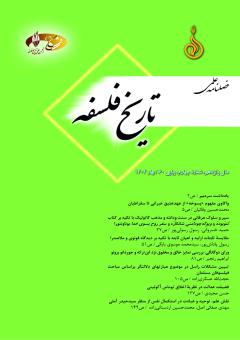تبیین مشکلات راسل در موضوع عبارتهای دلالتگر بر اساس مباحث فیلسوفان مسلمان
محورهای موضوعی : مطالعات تطبیقی تاریخ فلسفه
1 - دانش آموخته دکتری فلسفه، واحد علوم و تحقیقات، دانشگاه آزاد اسلامی، تهران، ایران
کلید واژه: راسل, فلسفه تحلیلی, عبارتهای دلالتگر, وجود ذهنی, فلسفه اسلامی, معدوم,
چکیده مقاله :
برتراند راسل یکی از بنیانگذاران فلسفة تحلیلی بشمار میآید. او در کنار گوتلوب فرگه و لودویگ ویتگنشتاین، نقشی برجسته در توسعة این نهضت فلسفی داشت. راسل تلاش میکرد مسائل فلسفی پیچیده را با استفاده از منطق ریاضی و تحلیل زبان حل کند. بنظر میرسد واژگان و مفاهیمی که فیلسوفان تحلیلی، بویژه راسل در نحوة دلالت آنها با مشکل تبیینی مواجهند، در فلسفه و منطق اسلامی راهحلی دقیق دارد. برغم اینکه راسل به اهمیت کلیات در معرفتشناسی و شناخت پی برده، اما تقسیمبندیهای دقیقی که فیلسوفان مسلمان درباب کلیات داشتهاند، در آثار امثال راسل حضور ندارد. فلسفۀ تجربهگرایی غرب بدلیل عدم توجه به کلیات انتزاعی و انکار آنها، نتوانسته است تبیینی درست از انطباق مفاهیم با ابژهها ارائه دهد و این همان مشکلاتی است که فیلسوفان تحلیلی، ازجمله راسل، به آن دچار گشتهاند. اما حکمای اسلامی با طرح مباحث دقیق مفاهیم کلی و تفکیک آنها به معقولات اولی یا معقولات ثانیه فلسفی و منطقی، از نحوة انطباق و دلالت این مفاهیم بر واقعیت سخن گفتهاند. همچنین آنان با مطرح کردن موضوع مهم وجود ذهنی در معرفتشناسی، توانستهاند برای معدومات و ابژههای غیرواقعی نیز تبیینهایی دقیق ارائه دهند که غالباً این مباحث مورد غفلت راسل و فیلسوفان تحلیلی بوده است.
Bertrand Russell is considered to be one of the founders of analytic philosophy. Alongside Gottlob Frege and Ludwig Wittgenstein, he played a significant role in the development of this philosophical movement. Russell attempted to solve complex philosophical problems using mathematical logic and linguistic analysis. It seems that the words and concepts whose denotations pose an explanatory problem for analytic philosophers, especially Russell, have a precise solution in Islamic philosophy and logic. Although Russell recognized the importance of universals in epistemology and cognition, Muslim philosophers’ precise classifications of universals are absent in the works of figures like him. Western empiricist philosophy, due to its disregard for and denial of abstract universals, has been unable to provide a correct explanation for the correspondence of concepts with objects, which is the same problem that analytic philosophers, including Russell, have encountered. However, by presenting precise discussions on universal concepts and distinguishing them into primary intelligibles or secondary philosophical and logical intelligibles, Muslim philosophers have spoken about how these concepts correspond to and denote reality. Furthermore, by introducing the important topic of mental existence in epistemology, they have been able to provide some accurate explanations even for non-existent things and unreal objects; discussions that have often been overlooked by Russell and analytic philosophers.
ابن¬سینا (1392) اشارات و تنبیهات، ترجمة حسن ملکشاهی، ج2،تهران: سروش
راسل، برتراند (1395) «درباب دلالت»، ترجمة رضا دهقان، دوفصلنامه مجله فلسفه، شمارة اول، ص46ـ37، انجمن علمی دانشگاه تربیت مدرس.
طباطبایی، سیدمحمدحسین (بی¬تا) بدایة الحکمة، قم: مؤسسة نشر اسلامي.
فاضل تونی، محمدحسین (1386) مجموعه رسائل عرفانی و فلسفی، قم: مطبوعات دینی.
مطهری مرتضی (1376) مجموعه آثار، ج 5 و6، تهران: صدرا.
ملاصدرا (1368) الحکمة المتعالیة فی الأسفار العقلیة الأربعة، ج1، قم: مصطفوی.
Berkeley, George (N.D.). A Treatise Concerning the Principles of Human Knowledge, https://www.gutenberg.org/ebooks/4723
Frege, Gottlob (1952). On Sense and Reference. ed. by P. Geach and M. Black, Oxford: Blackwell.
Hume, David (1896). A Treatise of Human Nature, reprinted from the original edition in three volumes and edited, with an analytical index by L.A. Selby-Bigge, Oxford: Clarendon Press.
Meinong, Alexius (1960). The Theory of Objects. trans. by Isaac Levi, D. B. Terrell, and Roderick M. Chisholm. in Realism and the Background of Phenomenology, ed. by Oderick M. Chisholm. Glencoe, IL: Free Press. pp. 76-117.
Mill, John Stuart (1843). System of Logic. vol. 1. London: John W. Parker.
Russell, Bertrand (1905). On Denoting. Mind, vol. 14, no. 56, pp. 479-493.
Russell, Bertrand (1912). The Problems of Philosophy, New York: Henry Holt.


